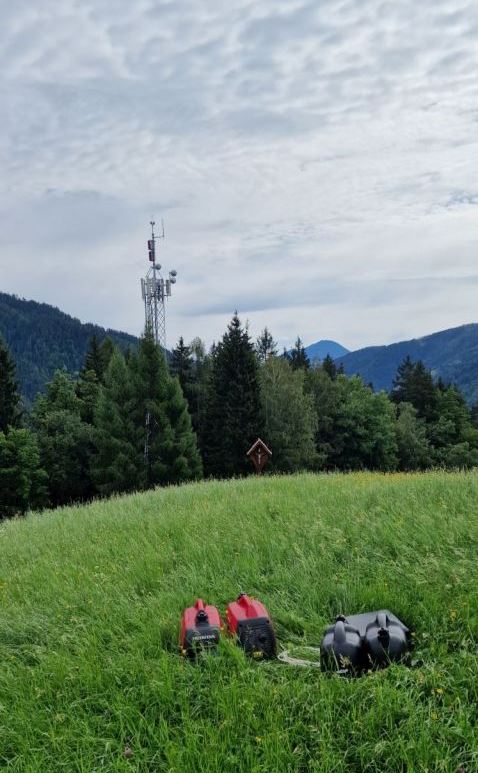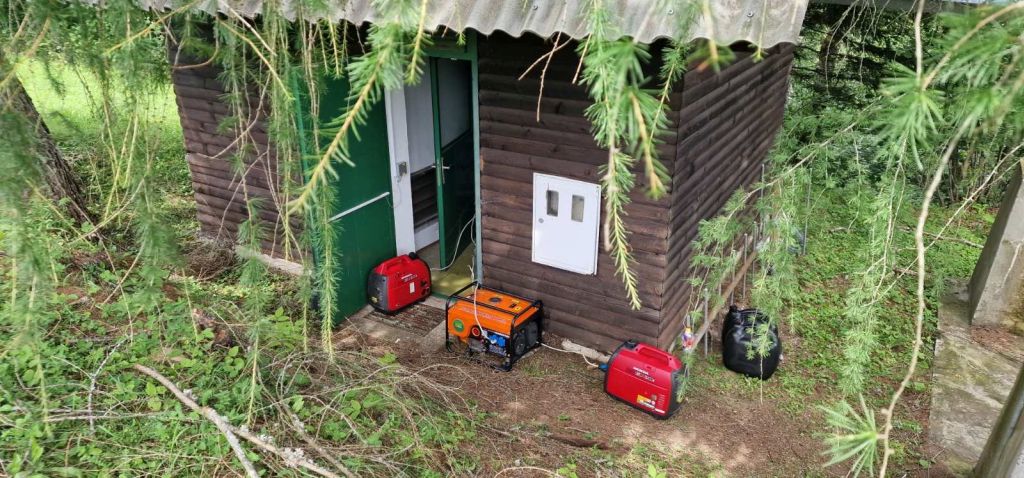"He was navigating through rugged roads to reach the transmitter by following the directions of a local resident", the Director of the IT and Telecommunications Office at the General police Directorate proudly narrates on his employee's mission. Thus read the opening sentence of the news about the officer of the IT and Telecommunications Office, who stayed in proximity of the transmitters in Koroška, the severely flooded region, where telecommunications and other connections were cut off from the rest of the world between Saturday, 5 August and Wednesday, 9 August, overseeing the operation of telephone and radio signals, which were essential for smooth running of the intervention and rescue services.
While he was on duty in the police communications control centre, the officer detected issues with interference of signals and decided to act immediately. Operational communication networks are a high priority for the police, rescuers and others, who need to stay in touch and communicate in order to perform the highly demanding tasks in flooded areas. It is hard to imagine any rescue operation without working communication networks. In addition to police experts, other expert staff was involved in maintenance and reestablishment of communication systems, including the Air police Unit, who helped transport the material by air due to limited access and impassable roads.
Because immediate air transport was not possible due to bad weather, the IT and Communications Office officer had to look at other options to reach the area. He said that this was the most difficult part. He also had to bring with him everything that he might have needed in case something went wrong. "These issues cannot be fixed by simply pressing the on/off button. So one must make sure to bring everything, absolutely everything with him. Moreover, you must look at all the possible scenarios: which cables will need connecting, what will have to be adjusted, etc. One also needs a powerful 4x4 vehicle, a tall vehicle to overcome any obstacles on the road. One needs to bring several power generators as well as tens of litters of petrol to power them. One needs the keys to open the doors of all the buildings and facilities; cables, wires, sockets, pliers and other tools and 'spare' parts to make the base station operational. As well as a chain saw, chains and similar in case you might need them. You also need toiletries, clothes and supplies, if the situation should require you to stay at the base station for several days. And you must collect and get everything ready in two hours max," our fellow officer explained in a long telephone conversation following his return.
The police officer reached the area from the Austrian side of the border, with the help of information provided by Austrian police officers and two local residents, one of whom was also a police officer unable to leave home because of the disaster. He was therefore able to help his colleague and the first system was rendered operational very quickly, re-establishing the communication of the residents and intervention services. Aware of the importance of keeping the system operational, the police officer stayed in the area, while the locals kindly provided him with accommodation and food.
In the days that followed, the slightly improved weather conditions allowed the air police unit to assist with air transport, whereas the police officer of the IT & Telecommunications Office single-handedly oversaw the operation of the entire communication system until Wednesday, 9 August.
The police officer's "odyssey" finally concluded when the electricity supply was re-established in great hurry due to the approaching new period of bad weather.
The locals nicknamed the officer "the first rescuer". Our colleague modestly says that he was just doing his job and that he was no longer able to sit around at home, on the other side of Slovenia, and follow the situation from the television screen. He said that he merely did what he does best: fix the radio communication systems and get them working, to re-establish connections for the people and the intervention services. He repeatedly said that the situation required lots of communication between several of stakeholders in order to make everything running as it should.
The police officer was modest to the point that he refused any public exposure or praise. We nevertheless assessed that the work he did was nothing less than exceptional and that he made us very proud. He lives in the Primorska region and had never been to that part of the country before. He promised to visit the locals, who made him feel very welcome and took such good care of him during his unplanned stay as soon as the situation goes back to normal.



